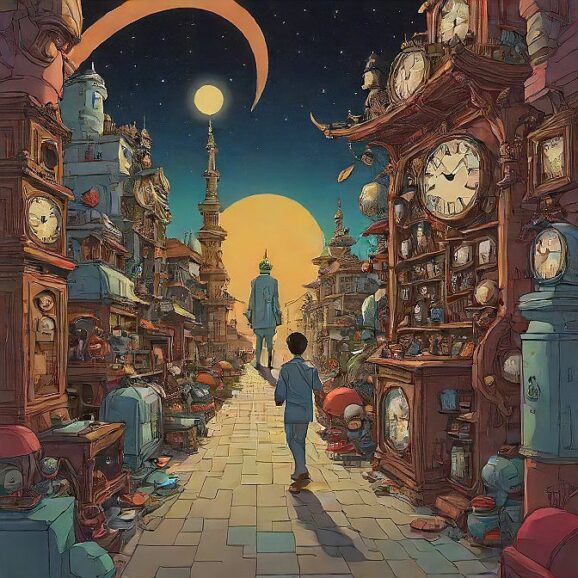There is No Such Thing as Trust Yourself. Enter The Paradox
Trust Yourself? We Need to Talk About That
You Think You’re Objective But You’re Kidding Yourself
How can you really trust yourself or what your own mind is telling you when everything around is twisted and biased?
Paranoia of information is the new normal.
Ok, that’s an understandable claim to distrust most of the people, news, etc.
But hey, at least it shouldn’t be an issue trusting yourself and your own thoughts.
Think again!
Let’s get one thing straight about trusting our own minds before going further.
We all like to think we see the world objectively, calling it like it is, but behavioral science disagrees.
Let me explain.
According to science, ideas and concepts must be measurable, quantifiable, verifiable, and repeatable for you to consider them as ‘objective’.
But behavioral science doesn’t accept these variables entirely because they fail to account for unobserved psychological constructs.
One of those psychological constructs is the actor-observer bias.
And it’s a mind-blowing reminder of why you can’t fully trust yourself.
Here’s how it works:
When someone screws up, you chalk it up to their personal flaws.
Your friend cancels plans last minute? “She’s just a flaky and a disorganized girl.”
But when you do the same thing, suddenly you have a million justified excuses:
“My kid got sick and I had a crazy day at work.”
“I woke up with a severe headache. I can’t make it today”
You get the picture.
Logically though, this makes no sense.
You judge the other person’s character while letting yourself off the hook.
And that’s how deeply ingrained this self-serving bias is.
Researchers have tested this over and over.
We’re shockingly biased when it comes to weighing situations we’re directly involved in.
We defensively spin our own actions as forced by circumstances while assuming others’ screw-ups must reflect their terrible personality and intentions.
The scary part is that you don’t even realize you’re doing it!
These skewed judgments feel completely fair and objective in the moment inside your head.
Your brain and mine are the brilliant B.S artists.
We are crazy good at cooking up reasonable-sounding justifications to protect our fragile egos.
(Yes, let’s call it as it is).
Think about the last time you really messed something up whether it’s a work project or an important personal issue.
Did you fully own up to your mistake and shortcomings?
Or did your brain go into self-defense mode, dreaming up accountability-dodging excuses?
We’re all guilty of that and we end up in a cycle of self-sabotage.
That’s why, self-awareness is the ultimate prize.
So next time you catch yourself judging someone else harshly, pause.
Ask if you’d honestly hold yourself to those same high standards if the roles were reversed.
Chances are, you’ll conveniently find tons of mitigating reasons why your version wouldn’t be so bad.
And that’s precisely why you can’t trust your own mind if self-awareness and accountability are absent.
Almost all of our judgments are shaped with self-serving double standards that we’re completely blind to.
This happens unconsciously most of the time.
We think we’re objective and confident in our decisions, but we’re actually not.
Pretty messed up, huh?
Now, I wish this is the part where I tell you that this is the only self-serving bias to pay attention to.
It’s not.
There are other biases that all play along to drive our fake sense of trust and objectivity.
Foe example:
Confirmation bias pushed you to search for, favor, and recall information that only confirms your existing beliefs while ignoring contradictory evidence.
Think about all the political views that you adopt while ignoring dissenting perspectives.
It’s just one prime example of this.
Another bias is the Hindsight bias.
This is when you convince yourself after the fact that you knew it all along, reconstructing the past inaccurately.
For example, think of a job or a company you applied for that got bad press.
“I knew they were shady all along!” you say when you were originally excited about the job.
And finally my favorite, the blind spot bias.
We do this mostly all the time.
This is when we fail to recognize our own cognitive biases while being able to identify them in others.
I don’t even need to give you an example because I’m sure you can think of so many.
These are just a few biases that allow you and me to privilege information that flatters our sense of self rather than objectively weighing evidence.
And we often hugely underestimate how susceptible we are to their influence.
Your Decision-Making is Also Not That Trustworthy.
Have you ever noticed how brilliant you think your decisions are at the moment?
But later, you look back and wonder “what the hell was I thinking?”
At some point, we all fell into that.
The uncomfortable truth is that your mind is so easily hijacked by hidden motives and external influences you’re not aware of.
Just think about all the bad purchases you’ve made, the ones that seemed so sensible to you at the time.
Maybe it was an overpriced apartment that felt “perfect” until the headaches set in.
Or that fancy kitchen gadget you bought a while back that it’s collecting dust now.
Everything is fueled by slick marketing and narratives that play on your desires subconsciously.
This is a bit hard to accept because you and I like to believe we approach decisions through pure logic and conscious choice.
But behavioral research shows otherwise once again.
We’re very vulnerable to unconscious psychological forces that subtly manipulate us in ways we can’t perceive.
Sigmund Freud said that centuries ago.
Also, a recent study by the psychologist Benjamin Libet proves that too.
It shows how these unconscious mechanisms or forces drive and shape our decision-making.
Let’s take the “decoy effect” for instance.
Studies found that you are more likely to purchase an item, a shirt for example, simply by introducing a third expensive “decoy” option.
This is designed to make the shirt more attractive to you in comparison.
Here’s another situation, anchoring.
This is when you heavily weigh your decisions based on limited information you come across even if it’s completely irrelevant.
One experiment showed apartment pricing estimates were swayed by having people first consider an unrelated number they had no reason to be influenced by.
In other words, if I expose you first to a high or low price for an unrelated product, that number would likely anchor you.
It means it will influence your estimates of apartment prices, even though the initial price had no logical bearing on apartment values.
Hope that makes sense.
Anchoring is also one of the reasons why we become impulsive, lack trust in others (or even ourselves) and why we regret that later on.
The reason is that we generally dislike feeling out of control or have no say in the matter.
And because our brains demand answers, we latch onto any information to make sense of something.
That will ultimately drive our acts or words which could be bad or totally avoided if we had all the right information first.
Let’s tackle another angle.
Environmental nudges, social factors, mental shortcuts, and emotional state are other reasons that shape your decisions.
Remember the last time you swore to eat clean for the next 3 months only to ditch that idea when your friend order pizza?
Maybe the lighting in a car showroom secretly sways your aesthetic preference to pick a Dodge over a Hummer?
Or you get peer pressured into doing or saying something because you can’t say no to groupthink?
And on and on and on.
So as you can tell, these forces have profound impacts on the most significant decisions in our lives.
Your careers, relationships, where you choose to live, and who to partner with, are all driven by something.
In retrospect, many of your “well-reasoned” choices were likely nudged along by somewhat trivial contextual details beyond your conscious control.
And all of us are guilty of this too.
Sadly, these profound events that shape our lives are not grounded in reliable certainty like math where 1+1 will always objectively equal 2.
Our entire world works efficiently on this rule no matter what.
However, everything else in your life and mine doesn’t come from impartial logic.
We just picked the best subjective experience or definition to expand our trust in things and to feel better.
That’s why we have factions, groups, and people supporting and negating the same idea with perfectly constructed reasons.
Make sense now?
At every turn, your mind is shaping subjective truths based on these unconscious forces.
You then accept whichever subjective version of events that allows you to trust yourself and the choices you make that make sense to you.
So next time you feel so confident about a big life decision based on your meticulous analysis, think again.
Are you being rushed, influenced, judged, guided or manipulated by someone or something or is it really what you think?
That’s why, so many of us hit mid-life crises or existential dreads.
These events are a wake-up call for us.
It’s when you realize that whatever we thought or taught is now causing more harm than good.
We went through life thinking we were in charge, but we didn’t.
That’s why it’s hard to fully trust ourselves since we may not be the critical thinkers in the driver’s seat as much as we want to most of the time.

Your Memories? They Are Lying to You About Trust Too
Why do I feel like you want to punch me in the face?!
Anyways!
I was reading an old post by Mark Manson the other day and he mentioned something interesting about this topic.
So here’s the idea.
You and I like to think we remember stuff exactly how it went down. (And we do to a very limited extent).
The harsh truth? Your memories are con artists.
They reconstruct events through a biased filter that has you questioning if you can believe anything they tell you.
Think about an argument from the past that still irks you.
You vividly recall your partner or coworker acting like a raging jerk.
The arrogant smirk they project as they berated you.
Except…that’s just the story your memory wants you to believe.
See, our memories don’t play out like an impartial video evidence.
They’re heavily edited reenactments, distorted by our skewed perspectives and agendas in the present moment.
All the stuff that made you look bad, foolish, or act unreasonably? Conveniently left out of your biased recollection.
Meanwhile, your rivals’ actions get reimagined in vivid detail that paints them as villains and you as a victim.
I’m not guilty of this too at some point in my life.
What’s more, we tend to vividly “record” events that stroke our egos or insecurities while glossing over the mundane.
That mortifying social blunder you can’t stop cringing over?
Yeah, you likely amplified its significance far beyond how it actually registered for others at the moment.
We often misremember the past as being much rosier than reality.
Just ask someone you know who had a tough upbringing.
Their nostalgic childhood memories will probably clash with their parents’ stories of constant money troubles back then.
Interestingly, even the passage of time rewrites our memories through skewed filters of regret or reminiscence.
Details get re-imagined, and motivations revised.
All without conscious awareness that we’re falsifying our own experiences to gel with current narratives.
So can you really trust those vivid memories fueling your strongest opinions and core beliefs about the past?
Are they maybe just illusions your mind play out to keep your perceived reality intact?
That’s why it’s hard to perfectly recall something from the past ENTIRELY as it went down.
Hence, I don’t think our memories serve as an objective measurement.
It’s All a Mind Game Eventually.
This is my favorite section because I have a thought here to share.
Have you ever zoned out while driving on a familiar route?
Even though you weren’t focused, you still arrived to your destination with little recollection of making all the turns and stops along the way.
The reason is simple.
Your conscious mind has an extremely limited bandwidth for focused attention. This is also called cognitive bandwidth.
That means while you were almost on auto-pilot, your unconscious mind was taking in and processing millions of visual cues, sounds, and motions.
Your conscious awareness only briefly kicks in when something unexpected demands your attention.
It’s like your conscious experience is just the tiny peephole of reality that your brain deems important enough to show you in any given moment.
The vast majority of sensory input and cognitive processing happening behind the scenes remains completely outside your awareness.
That’s why you can be catching a ball while simultaneously planning what to cook for dinner and reminiscing about last night’s date.
The point here is that at any given moment, you’re only directly, consciously experiencing the smallest glimpse of the actual information.
This shadow processing outside your conscious view is what’s really calling the shots, shaping your decisions and behavior at any given moment.
So when you try to logically reconstruct your decision-making after the fact, you might run into a problem.
This is because you’re really just attempting to reverse engineer a heavily unconscious process that your conscious mind was largely oblivious to in the first place.
It’s impossible to attain full self-insight when so much of what defines you as a person is going into that unseen unconscious realm.
The best example I can think of to drive this point home is like driving a car.
You’re a backseat passenger along for the ride and forced to trust a driver whom you can’t verify his true intentions and navigation skills.
And this inherent blind spot makes true self-trust and comprehensive self-knowledge somewhat out of reach.
Does that freak you out?
Blame it on your friend like you did last time. (Oh, I’m kidding, or am I)?! 🙂
“The unconscious mind is the real genius in our life. The conscious mind is the one that thinks it’s in charge.”
– Deepak Chopra
Thanks for reading!
What caught your attention or found hard to believe?
Do you have an idea or a concept that helps you make better decisions?
I’d love to hear your thoughts in the comment section.
Until next time 🙂



